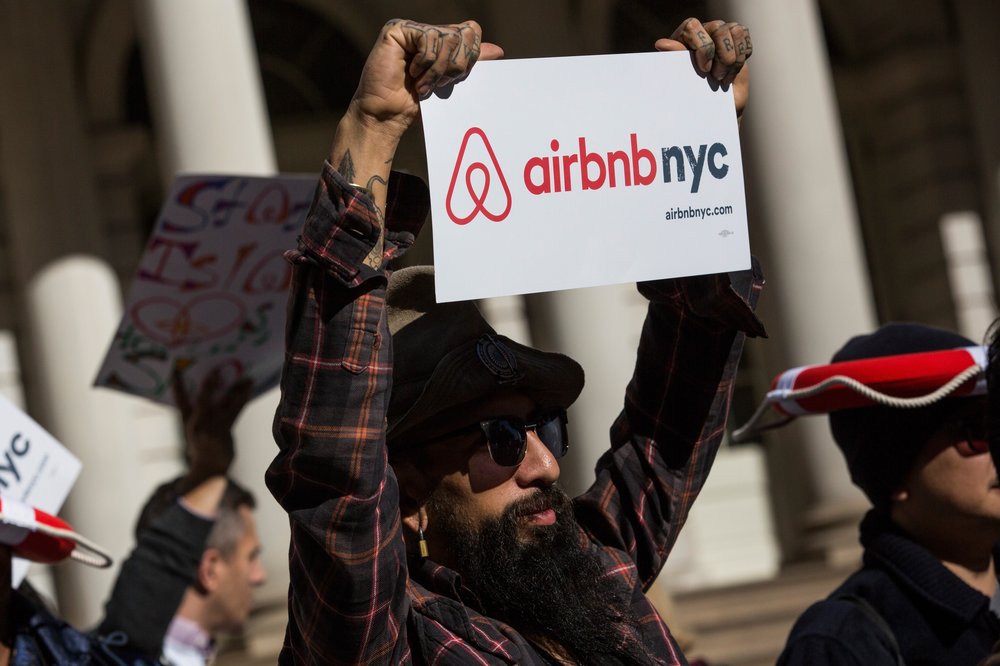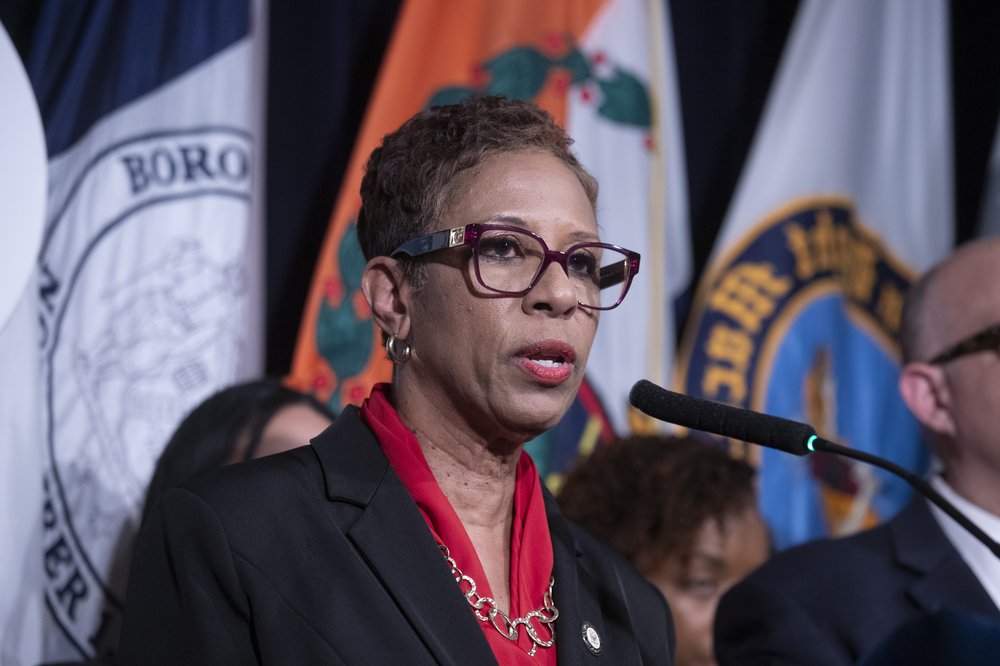Locked out of NYC, Airbnb is now single largest spender in local elections
April 10, 2025, 6:30 a.m.
The short-term rental giant is spending $5 million to influence local elections. Will they also try to influence the race for mayor?

The world’s biggest vacation rental platforms are all but locked out of the country’s biggest city due in large part to new regulations that went into place in 2023. Now Airbnb is spending millions of dollars to back candidates for local office who support easing those restrictions.
Airbnb has seeded its SuperPAC “Affordable New York” with $5 million to influence local elections, making it the single biggest spender in the 2025 campaign season so far, according to Gothamist's review of campaign finance records. The short-term rental giant has already begun buying about $600,000 worth of ads and mailers backing a slate of City Council candidates, along with one current councilmember who is vying to become Bronx borough president — escalating its effort to allow short-term rentals in one- and two-family homes while running headlong into the powerful hotel industry and its influential labor union.
The company has yet to throw its financial weight into the mayoral race, but that could change.
Nathan Rotman, Airbnb’s North American policy and strategy director, told Gothamist in a written statement that the company “is just getting started” with its campaign spending. He said the company will be emptying even more of its SuperPAC coffers in New York City’s primary and general election races this year to “support candidates who champion common-sense solutions to help everyday New Yorkers navigate the affordability crisis.”
City campaign finance law prohibits City Council candidates from accepting more than $1,600 from individuals and it bars mayoral candidates from taking in more than $3,700. But it’s a free-for-all when it comes to so-called independent expenditures, like the ads and website paid for by Airbnb’s Affordable New York SuperPAC, that operate separately from individual campaigns.
The company didn’t rule out backing a candidate in the marquee Democratic mayoral primary or in what could become a five-candidate general election for mayor in November. That potentially opens a lane for a mayoral hopeful to benefit from more than $4 million in cash that Airbnb’s Affordable New York has yet to spend. But strategists and consultants say the politics are tricky.
“It’s a tremendous amount of money,” said campaign strategist Albert Suh, who is not working with any of the city’s current mayoral candidates. But, he added, the pot of cash — which the SuperPAC is using to mail fliers to registered voters and buy social media ads — carries some baggage.
Any candidate who embraces legislation easing short-term rental restrictions is placing themselves “pretty squarely against the Hotel and Gaming Trades Council’s priorities,” he said.
The powerful hotel industry and its labor union consider Airbnb public enemy number one because the company is a direct competitor for tourist dollars. Tenant groups also oppose easing the city’s short-term rental restrictions. They argue that taking apartments off the market and turning them into de facto hotel rooms is exacerbating an already dire shortage of affordable housing. Airbnb and its supporters dispute that.
Hotel Trades Council Political Director Bhav Tibrewal said Airbnb is wasting its money.
“Airbnb has tried this before and each time their money hasn’t influenced elected officials and candidates who know that dollars don’t vote,” Tibrewal said in a statement.
Their money’s green and at the end of the day, that’s what candidates care about.
Diana Gonzalez, a Brooklyn-based political consultant
Five Democratic mayoral candidates have already said they oppose changing short-term rental laws. But Speaker Adrienne Adams, who is also running for the city’s top job, has sponsored a bill to ease the restrictions. The original bill would have amended current law to allow one- and two-family homeowners and tenants to list units on platforms like Airbnb without being present, but it has since been watered down. Two other top candidates, former Gov. Andrew Cuomo and Mayor Eric Adams — both of whom have received hotel union support in past campaigns — aren’t willing to say whether they would welcome Airbnb support.
Still, some candidates may be willing to embrace Airbnb as the race heats up and their fundraising lags, said Diana Gonzalez, a Brooklyn-based political consultant.
“Their money’s green and at the end of the day, that’s what candidates care about,” Gonzalez said.
No candidate may be better positioned to appeal to Airbnb than Speaker Adams, who entered the mayoral race later than most of her competitors and whose fundraising efforts are trailing some by millions of dollars. The speaker co-sponsored the bill relaxing short-term rental restrictions for one- and two-family homeowners last fall. Campaign finance records show Airbnb has spent more than $80,000 to bolster her Chief of Staff Ty Hankerson’s campaign to win the seat Speaker Adams will vacate at the end of her term.
Hankerson isn’t touting that support, at least not publicly.
“Ty has not met with Airbnb in his candidate capacity, but he has met with HTC and is proud to be a supporter of hotel workers, tenants and homeowners in the district,” said Hankerson's campaign consultant Tyquana Henderson-Rivers.

Airbnb has spent roughly $500,000 to back every other incumbent candidate who signed on to the bill to ease restrictions — except for its original sponsor, Councilmember Farah Louis of Brooklyn. Louis angered Airbnb and other bill supporters when she watered down the measure earlier this year. Louis did not respond to a request for comment.
In addition to Hankerson, Airbnb’s Affordable New York SuperPAC is spending money on ads and mailers promoting incumbent Councilmembers Selvena Brooks-Powers, Amanda Farias, Oswald Feliz, Mercedes Narcisse, Kevin Riley and Althea Stevens. It has also purchased social media ads supporting Councilmember Rafael Salamanca’s bid for Bronx borough president.
Speaker Adams’ spokesperson Lupe Medina said the campaign is not coordinating with any independent expenditure, but she did not answer further questions about whether the speaker would welcome Airbnb’s support.
Airbnb has an uphill battle.
Patrick Jenkins, political strategist
Five other mayoral candidates in the Democratic primary have blasted the bill to relax short-term rental restrictions on the campaign trail. At a December candidate forum organized by tenant groups, City Comptroller Brad Lander, state Sen. Jessica Ramos, former City Comptroller Scott Stringer, state Sen. Zellnor Myrie and Assemblymember Zohran Mamdani all said they support current rules that prohibit property owners from renting out units for less than 30 days unless they receive special certification from the city.
“What it would be is a first-of-its kind, dangerous precedent across the state,” Mamdani said of legislation to allow more short-term rentals. “Right now, we need to make clear: housing units across New York City need to remain exactly that.”
Ramos cited the hotel labor union's opposition. And Lander is pitching an idea based on the Airbnb model by enlisting other existing online platforms to link New York City tenants with property owners who have extra rooms for long-term rental.
Former Assemblymember Michael Blake was the lone Democrat at the candidate’s forum who said he supports changing the rules to allow smaller property owners to lease short-term rentals.
That leaves two other prominent candidates: Mayor Adams, who is now running as an independent, and former Gov. Cuomo, who is leading every Democratic primary poll by a wide margin. Neither campaign responded directly to questions.
But both candidates have had close ties to the hotel industry and the labor union, which endorsed Adams for mayor in 2021 and may do the same for Cuomo ahead of the Democratic primary.
Cuomo’s spokesperson Rich Azzopardi did not provide a response to questions about short-term rental rules or Airbnb support.
Mayor Adams presided over a crackdown on Airbnb and other short-term rental companies earlier in his first term. Still, his political base includes many outer borough homeowners eager to list their properties on short-term rental platforms. His campaign spokesperson, Todd Shapiro, said he would ask Mayor Adams whether he would welcome Airbnb’s support but did not respond to follow-up calls and messages.
The spending campaign is Airbnb’s latest foray into politics at the local and national level. State records show the company spent more on lobbying than all but a handful of interests, companies and labor unions last year. Its co-founder, Joe Gebbia, joined the Trump administration’s controversial cost-cutting taskforce, known as the Department of Government Efficiency.
Airbnb could end up seeing its biggest impact in Council races, which attract far less spending than the citywide mayoral contest.
But Patrick Jenkins, a veteran strategist, said it will take more than a few million dollars for Airbnb to wield real clout in the five boroughs. He said the company needs deeper political ties.
“Airbnb has an uphill battle to win a significant number of races to make a substantial case against their opposition,” Jenkins said.
This story was updated with comment from the Hotel Trades Council.
Efforts to revive Airbnb in NYC are sputtering amid multi-million-dollar lobbying efforts Will Airbnb return to NYC? Bill would allow short-term rentals for 1- and 2-family homes. These Bed-Stuy blocks lost 80% of their Airbnbs after NYC’s short-term rental crackdown